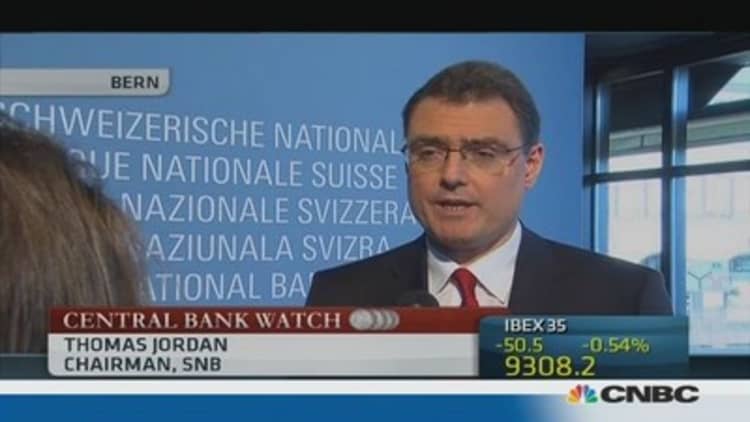
Switzerland's exchange rate peg against the euro remains "absolutely necessary", despite waning deflation risks and the upturn in the single currency, the head of the Swiss National Bank (SNB) told CNBC.
On Thursday, the SNB opted to continue its foreign currency purchases aimed at maintaining a minimum exchange rate of 1.20 Swiss francs to the euro. The SNB also held its three-month Libor target range at 0.00-0.25 percent.
"The minimum exchange rate remains absolutely necessary in order to ensure adequate monetary conditions in Switzerland. It is insurance against sudden shocks in the exchange rate so that we can work against deflation in Switzerland," said SNB Chairman Thomas Jordan.
The central bank introduced its foreign exchange target back in September 2011, when investors bought up massive amounts of the Swiss franc as a safer foreign exchange alternative to the euro or the dollar. This caused the value of the franc to appreciate steeply, threatening the health of Swiss exporters.
By intervening in the currency markets, SNB is thus one of four major central banks with a large asset-buying scheme — the others being the Federal Reserve, the Bank of England and the Bank of Japan. Ratings agency Standard & Poor's estimates the four banks pumped a total of $1.6 trillion into the global economy this year, to be followed by another $1.0 trillion in 2014.
(CNBC Explains: Quantitative Easing)
Jordan said that Switzerland's success in combating deflation — in November, consumer price inflation (CPI) rose above zero on a yearly basis for the first time in over two years — was a sign the central bank should continue the policy rather than halt it.
"The introduction of the minimum exchange rate had a very positive impact, so at the moment we have zero inflation, neither inflation nor deflation, and that is a very good result," Jordan said.
The SNB forecasts deflation of 0.2 percent for 2013 as a whole, followed by weak price rises of 0.2 percent and 0.6 percent in 2014 and 2015 respectively.
(Read more: Swiss voters reject proposal to limit executives pay)
Jordan said the impact on Switzerland of the Fed scaling back its $85 billion per month asset purchases would depend on the hit to global financial markets. Markets fear the U.S. central bank could start tapering as soon as its policy meeting this month, and are highly sensitive to any hints regarding this likelihood.
"It depends on the volatility in markets. There was some volatility in the Summer and in the Fall of 2013 after the tapering discussion. We expect all central banks will take the possible volatility into account, in the hope that the volatility will be as small as possible," Jordan said.
(CNBC Explains: Tapering)
Meanwhile, Paul Robson, head of European foreign exchange strategy at RBS, forecast the SNB would maintain its own asset purchases, and exchange rate target, for the "foreseeable future". He explained that Switzerland would remain at risk from excessive capital inflows so long as growth in the euro area stayed weak.
"I think from the SNB's point of view, they would have hoped the euro-Swiss would be higher by now, given the tail risks around Europe receded quite significantly during 2013. The fact that it isn't, means that the SNB will be very watchful and very much not wanting to move away from the peg in the foreseeable future," Robson told CNBC.
(View more: Risks from capital inflows into Switzerland remain)
—By CNBC's Katy Barnato. Follow CNBC on Twitter: @CNBCWorld

